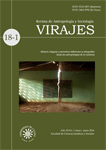Authors
Abstract
The armed conflict in Colombia has been the most significant exponent of violence and it has also been the clearest conductor of fear, silencing populations and turning it into a mediator of realities. When fear is used as a tool to silence, it profoundly affects representations of the people, their ways of life, their symbolic systems and their oral traditions, revealing continuities and transformations, in which; fear and narrative forms appear as a sensorial expression, a response and local knowledge. If we investigate the different expressions of fear and representations of silences more deeply, we can discover aspects of culture that describe human groups and their means of adaptation.
Keywords
References
Cátedra, M. (1988). La muerte y otros mundos. Madrid: Ediciones Júcar.
Galindo, M. (2003). Mitos y leyendas de Colombia, tradición oral indígena y campesina. Bogotá: Círculo de lectores.
Lafuente,A. (2000). ¿Qué se puede hacer con los monstruos? En Lafuente A. y Moscoso J. (eds.), Monstruos y seres imaginarios en la Biblioteca Nacional. Madrid: Biblioteca Nacional / Doce Calles.
Restrepo, G. (2004). Arqueología de la urbanidad de Carreño, los oficios de un rastreador y baqueano de la cultura. Bogotá: Universidad Autónoma de Colombia / Instituto Superior de Pedagogía.
Scheper-Hughes, N. (1997). La muerte sin llanto. Violencia y vida cotidiana en Brasil. Barcelona: Ariel.

 PDF (Español)
PDF (Español)
 FLIP
FLIP


















